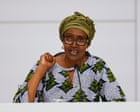
In a world where global cooperation and assistance play pivotal roles in addressing complex issues, recent developments have sparked profound concerns within the international community. Humanitarian aid cuts and access restrictions are poised to leave deep marks on societies already battling against severe adversities. Two unfolding situations, in particular, highlight these interconnected challenges—affecting the fight against HIV/AIDS and the welfare of vulnerable populations in conflict-affected regions like Gaza.
The executive director of UNAids, Winnie Byanyima, has underscored the far-reaching ramifications that could stem from substantial cuts to US aid spending. The United States’ decision to slash funding for the President’s Emergency Plan for AIDS Relief (Pepfar) signals a potentially detrimental impact on global health efforts. Byanyima has voiced her perturbation, warning that without the sustained influx of resources, the projected spike of 6 million new infections and 4 million AIDS-related deaths by 2029 may become a devastating reality. This dire forecast is a clarion call, emphasizing the intrinsic link between consistent support and life-saving interventions in the global fight against HIV/AIDS.
Transitioning to another intricate humanitarian concern, the Gaza Strip remains a hotspot of acute challenges. Health professionals, such as Dr. Ahmad al-Farra of Nasser Hospital, have raised alarms over a critical shortage of infant formula, exacerbated by Israeli restrictions on aid deliveries. This troubling situation places hundreds of infants at risk, compounding the region’s existing struggles with malnutrition and healthcare access. The lack of specialized formula for premature babies further illustrates the pressing need for solutions that prioritize the well-being of the most vulnerable.
These unfolding scenarios ripple beyond their immediate contexts, inviting a broader exploration of the underlying factors influencing aid decisions and the necessity for coordinated efforts to mitigate their effects. A mindful reflection on the ripple effects of aid cuts and access restrictions is essential, considering how interconnected global health and humanitarian efforts are intrinsic to fostering stability and security. Solutions that encompass diplomatic advocacy, partnerships, and innovative funding strategies could serve as bridges, guiding the international community toward alleviating these pressing challenges.
As these stories unfold, they underscore the value of sustained international collaboration and equitable program funding to ensure that aid reaches those in greatest need. With collective understanding and strategic foresight, there exists potential for turning these daunting challenges into opportunities for meaningful change. The task at hand is not solely to react but to proactively engage with the fundamental issues underlying these multifaceted crises. By doing so, a global community can chart a path toward resilience, prioritizing the health and dignity of all individuals across diverse landscapes.
Source: {link}
